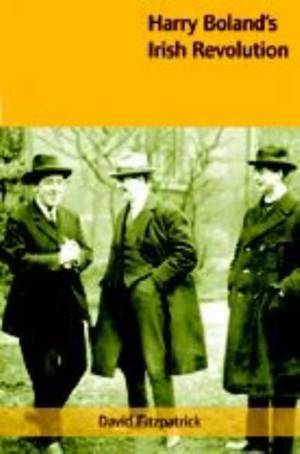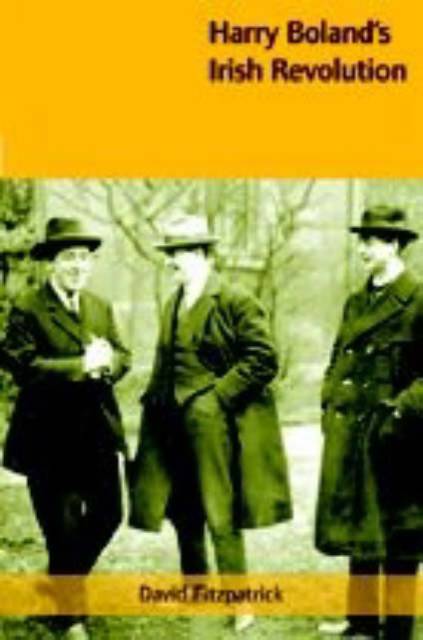
- Retrait gratuit dans votre magasin Club
- 7.000.000 titres dans notre catalogue
- Payer en toute sécurité
- Toujours un magasin près de chez vous
- Retrait gratuit dans votre magasin Club
- 7.000.000 titres dans notre catalogue
- Payer en toute sécurité
- Toujours un magasin près de chez vous
38,45 €
+ 76 points
Description
* First in-depth biography of Harry Boland
* Establishes Boland as a revolutionary organizer of comparable stature to his two more celebrated friends and colleagues Michael Collins and Eamon de Valera
* Author draws upon thousands of Boland's personal letters, diaries, police reports and other documents in Irish, British and American archives, and in family possession, many of which are previously unknown
The definitive biography of Harry Boland incorporating previously untapped archives and establishing him one of the most influential figures in Irish history. A complex revolutionary organizer, Boland is revealed as a politician of comparable stature to Michael Collins and Eamon de Valera
Apart from Michael Collins and Eamon de Valera, Harry Boland was probably the most influential organizer of the Irish Republican movement between 1916 and 1922. Already famous as a hurler before 1916, he was convicted and imprisoned after serving as a volunteer officer in the GPO. His influence later extended to almost every aspect of the Irish Republican Brotherhood and in his work as Irish envoy to America. He was intimately associated with both Collins and de Valera, but broke with Collins over the terms of the Anglo-Irish treaty in December 1921. He was the principal intermediary between the treaty's supporters and opponents, before being fatally shot by national army officers in the second month of the civil war.
Boland's mix of animal charm, gregariousness, wit and a dash of ruthlessness made him an influential and formidable character. Though not an intellectual in his manner he was a clear thinker, a forceful orator and a graceful writer. He was also a man about town, equally at home in Dublin, Manchester or New York, a bon vivant of varied tastes and amongst the most attractive yet elusive personalities of the Irish revolution.
David Fitzpatrick's biography draws upon thousands of letters to and from Boland as well as diaries, police reports, memoirs and other documents preserved in Irish, British and American archives and in family possession. These mainly unknown documents record in astonishing detail the inner workings of Irish republicanism, including its personal conflicts and alliances, and reveal the critical importance of fraternity in determining the course of Ireland's revolution.
* Establishes Boland as a revolutionary organizer of comparable stature to his two more celebrated friends and colleagues Michael Collins and Eamon de Valera
* Author draws upon thousands of Boland's personal letters, diaries, police reports and other documents in Irish, British and American archives, and in family possession, many of which are previously unknown
The definitive biography of Harry Boland incorporating previously untapped archives and establishing him one of the most influential figures in Irish history. A complex revolutionary organizer, Boland is revealed as a politician of comparable stature to Michael Collins and Eamon de Valera
Apart from Michael Collins and Eamon de Valera, Harry Boland was probably the most influential organizer of the Irish Republican movement between 1916 and 1922. Already famous as a hurler before 1916, he was convicted and imprisoned after serving as a volunteer officer in the GPO. His influence later extended to almost every aspect of the Irish Republican Brotherhood and in his work as Irish envoy to America. He was intimately associated with both Collins and de Valera, but broke with Collins over the terms of the Anglo-Irish treaty in December 1921. He was the principal intermediary between the treaty's supporters and opponents, before being fatally shot by national army officers in the second month of the civil war.
Boland's mix of animal charm, gregariousness, wit and a dash of ruthlessness made him an influential and formidable character. Though not an intellectual in his manner he was a clear thinker, a forceful orator and a graceful writer. He was also a man about town, equally at home in Dublin, Manchester or New York, a bon vivant of varied tastes and amongst the most attractive yet elusive personalities of the Irish revolution.
David Fitzpatrick's biography draws upon thousands of letters to and from Boland as well as diaries, police reports, memoirs and other documents preserved in Irish, British and American archives and in family possession. These mainly unknown documents record in astonishing detail the inner workings of Irish republicanism, including its personal conflicts and alliances, and reveal the critical importance of fraternity in determining the course of Ireland's revolution.
Spécifications
Parties prenantes
- Auteur(s) :
- Editeur:
Contenu
- Nombre de pages :
- 464
- Langue:
- Anglais
Caractéristiques
- EAN:
- 9781859183861
- Date de parution :
- 31-12-04
- Format:
- Livre broché
- Format numérique:
- Trade paperback (VS)
- Dimensions :
- 177 mm x 231 mm
- Poids :
- 766 g







